Trial of Activists Kusheyev and Karimov Nears Its Conclusion
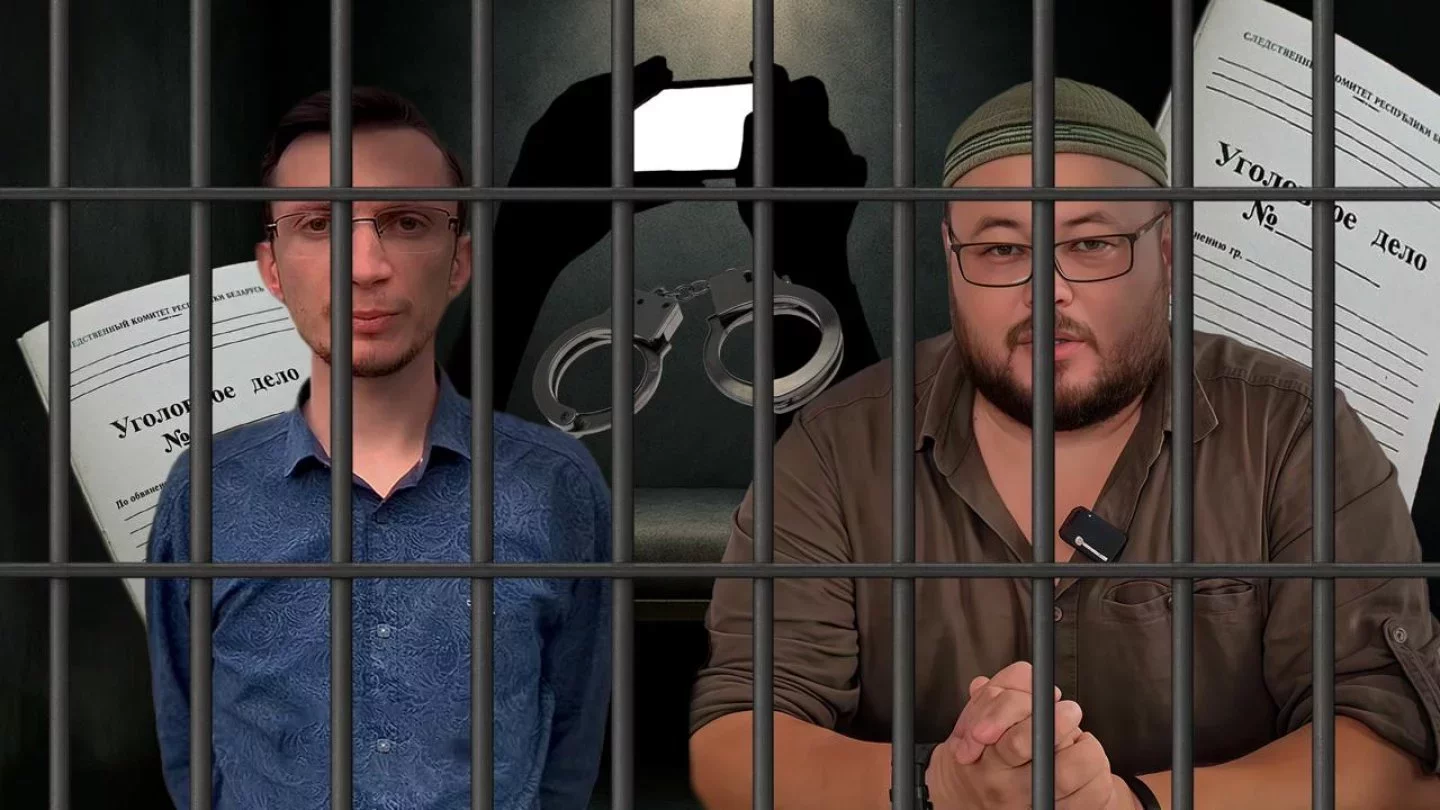 Photo: Orda.kz
Photo: Orda.kz
The trial of activists Damir Kusheyev and Ruslan Karimov is nearing its conclusion in Almaty. Along with entrepreneurs Kurmangazy Aitmukanov and Andrey Belyansky, they are charged under Part 4 of Article 194 of Kazakhstan’s Criminal Code, “Extortion on an especially large scale by a group of persons by prior conspiracy.”
According to investigators, the defendants allegedly blackmailed businessman Bakhtiyar Blayev using compromising videos, demanding 30.5 million tenge in exchange for silence.
At the time, Blayev was serving his sentence in Penal Colony No. 13. Aitmukanov filmed him freely driving around the city in his jeep — a clear violation of the conditions of confinement. Kusheyev later posted this footage on social media, commenting on what he described as the colony’s “permissive regime.”
In court, he stated that after the vlog was published, someone filed a complaint with the National Security Committee (KNB). The head of the penal colony was subsequently detained on suspicion of accepting a bribe and later convicted.
Kusheyev also claimed that one of the police officers involved in Aitmukanov’s arrest was later charged with protecting organized crime figures — despite serving in a special anti-organized crime unit. He further accused some employees of the Almaty City Prosecutor’s Office of lobbying for the Blayev family’s interests.
Our reporters listened closely to Kusheyev’s speech — that of a man who continues to portray himself as a public activist and anti-corruption crusader.
Different Rules
During the hearing, Kusheyev detailed how he met Aitmukanov, how their collaboration began, and why he agreed to post the controversial video.
It all started in October 2024. Aitmukanov found his phone number online and reached out to tell him about his conflict with Blayev during the construction and landscaping of a property.
We met at a café, and I asked him what he wanted from me. He said he wanted publicity. I warned him right away — anything that appears on my social media pages stays there. Even if he settles the dispute tomorrow. Kusheyev told the court.
The two agreed to meet again near the Nauryzbay District Prosecutor’s Office.
Kusheyev brought along his friend and lawyer, Ruslan Karimov.
Kurmangazy and other subcontractors who had suffered under Blayev gathered outside the prosecutor’s office. Ruslan filmed Kurmangazy’s appeal to the president and the prosecutor general, and I posted it on TikTok and Instagram. There were no complaints against me as the account owner, and no one filed a defamation lawsuit against me, Kusheyev said.
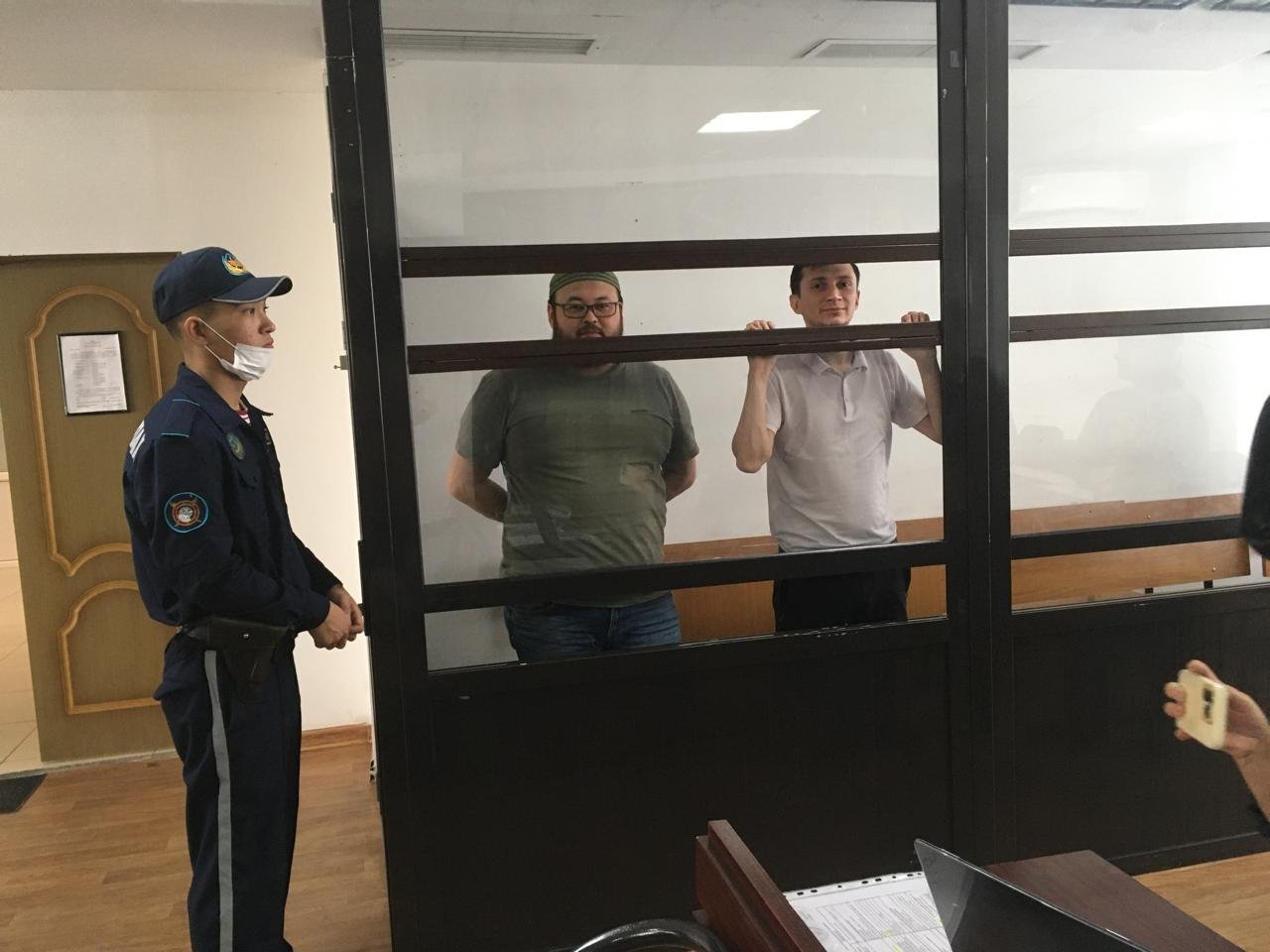
According to Kusheyev, he didn’t speak with Aitmukanov again for nearly three months. Then, on the morning of January 20, 2025, Aitmukanov called him unexpectedly — asking about conditions in the administrative detention center.
Since Kusheyev had been there before, he explained that detainees weren’t allowed to leave or use cell phones. Aitmukanov then mentioned a convict from Colony No. 13 who was allegedly seen driving around Almaty in a Jeep.
As a civic activist and anti-corruption advocate, I was intrigued. At that moment, I didn’t know it was Bakhtiyar Blayev, because Kurmangazy hadn’t mentioned his last name. I quickly got ready, skipped breakfast, and called Ruslan from the parking lot to join us. I had previously read on social media that some convicts freely leave the colony and go about their business, to a sauna, for example, or to do some shopping — so I wanted to see it for myself.
The pair drove to the meeting point using the coordinates Aitmukanov sent. When they arrived at the gas station, they saw Blayev — and, according to Kusheyev, it was a complete surprise.
Bakhtiyar and his younger brother Daniyar later claimed that three cars had supposedly boxed them in at the gas station, blocking their exit. I’ll say right away that my car was parked to the side. Kurmangazy and Bakhtiyar got out of his car, and Ruslan and I got out of mine. At that moment, Blayev wasn’t wearing handcuffs or ropes. No one forced him out of the car — he moved freely, could have gotten in, and driven away in another car from the gas station.
Kusheyev said Aitmukanov told him that Blayev had caused a car accident and fled the scene, and that he had pursued him until catching up at the gas station. Kusheyev then recorded a one-minute video of Blayev but never posted it online.
At that time, I knew Blayev had been charged with five criminal offenses, but I didn’t know which ones he was ultimately convicted of. So, in the video, I said he was serving time for fraud and still freely moving around the city. Ruslan corrected me, saying Blayev had been convicted of other crimes, and it would be better not to publish the video. I followed his advice. I didn’t post it — it’s still on my phone. Kusheyev told the court
According to Kusheyev, he stayed at the gas station for no more than 30 minutes. While he questioned Blayev, Karimov secretly recorded their conversation on a small recorder hidden in his jacket pocket. Kusheyev asked why a convicted person was freely moving around the city, where Penal Colony No. 13 was located, and how this was even possible.
Soon after, Blayev’s father and younger brother arrived at the scene — and tensions began to rise.
Blayev claimed he was being held and threatened. But there were three of us and three of them. What was he so afraid of, I don’t understand? He could’ve gotten into his family’s car and left, or stayed in his own car and filmed everything on his phone. He could’ve even called 102 and reported it to the police. Blayev also said that he supposedly wanted to resolve the conflict peacefully on the spot. So the question is why did he file an extortion complaint on January 22, 2025?
Kusheyev said he wasn’t interested in the argument between Aitmukanov and Blayev at the gas station, since it didn’t concern him directly. However, he insisted to the court and jury that Blayev had been the more active party, “constantly making proposals.”
After the encounter, the group drove to the Power Plant area, to the office of a private judicial enforcement officer, where they hoped to lift the freeze on the accounts of a company belonging to Aitmukanov.
The office was on the second floor of a commercial building. We stayed for no more than five minutes — I didn’t record anything there. Then Blayev suggested having lunch at a nearby café called Shafran to discuss the matter calmly. But another argument broke out between him and Aitmukanov, so Ruslan and I left. We stopped at a doner place for a quick bite. On the way, Ruslan suggested going to the penal colony to find out if inmates were really allowed to drive around the city.
At Penal Colony No. 13, they were met by the warden, a colonel of justice, and a major who immediately recognized Kusheyev from social media.
We asked them whether convicted persons were allowed to drive around the city or beyond its limits. The colonel replied that no, it was a violation. Then Ruslan took out his phone and showed them the chase video filmed by Aitmukanov. The footage clearly captured the moment when Blayev got out of his car and approached Aitmukanov. The warden watched the video and said he would take disciplinary action by adding a reprimand to the convict’s record, and later, Blayev himself admitted he was punished with two days in solitary confinement.
After leaving the colony, Kusheyev recorded the now-infamous video that later caused a stir on social media.
They stayed near the prison gates, waiting for Blayev and his brother. While they were sitting in the car, Aitmukanov pulled up next to them.
Kurmangazy told us that Bakhtiyar Blayev had called him after learning about our visit to the colony. We waited for about an hour and a half, maybe two, and then saw two men with their hoods pulled up heading toward the checkpoint. By the time we got out of the car, turned on our phones, and followed them, they had already gone inside. Then we spotted a black SUV belonging to Kudaibergen Blayev. That’s when we realized their father had brought his sons to the colony — and that they already knew we were waiting for them.
After that, Kusheyev said, they left the area. He dropped Karimov off and went with Aitmukanov to file a traffic accident report.
The defendants claim that Blayev rammed Aitmukanov’s vehicle, while prosecutors insist it was the other way around.
Public Stand
On the morning of January 22, 2025, Aitmukanov invited Kusheyev and Karimov for breakfast. During the meeting, he mentioned he had arranged to meet Blayev at noon to finalize a mediation agreement. He suggested the activists come along to the law office — but they declined.
Ruslan explained that it wasn’t our problem, so we had no reason to be at that meeting. And it’s a good thing I listened to him — otherwise, I would have been detained at that law office along with Kurmangazy. They would’ve just placed a bag of money next to me, and the investigator would’ve counted it on camera. Later, I saw a video of Kurmangazy’s arrest filmed by the Police Department’s press service. They confiscated 200,000 tenge in 5,000-tenge bills from his jacket pocket. He said it was his personal money. By the way, the Organized Crime Department officer who took part in the arrest was later detained by National Security Committee officers on suspicion of protecting members of a criminal group.
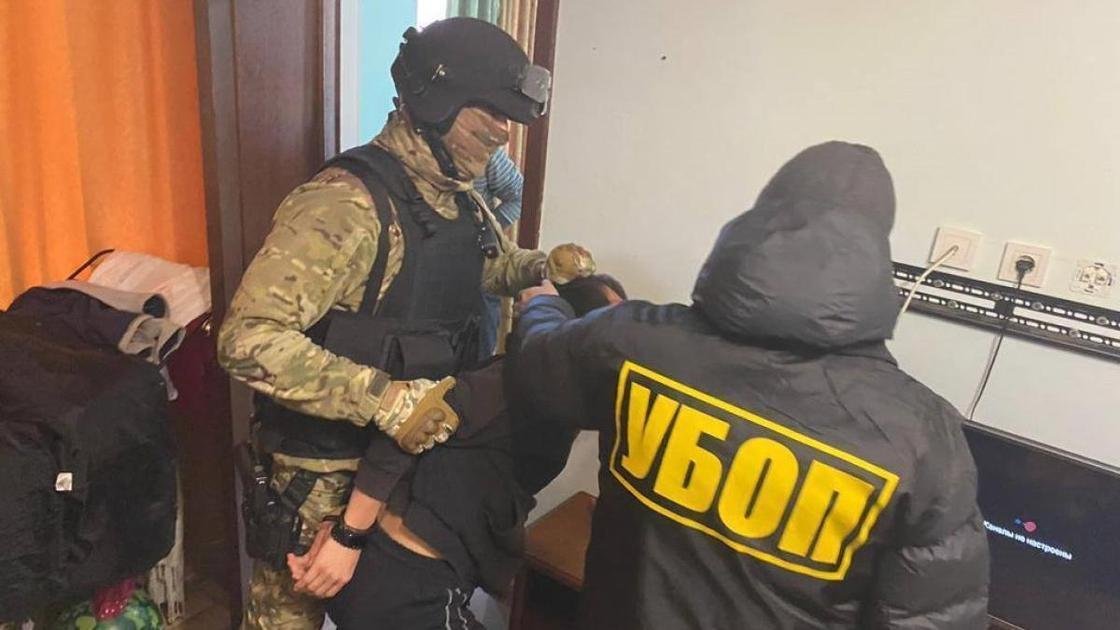
According to Kusheyev, his controversial video comparing the penal colony to a hostel ultimately had real consequences.
After my appeal, someone plucked up the courage to file a complaint against the head of the penal colony. I don’t know who it was, but I know that on March 6, 2025, a justice colonel was detained by the National Security Committee on suspicion of taking a bribe. That means there were corruption schemes in that facility. I heard you could pay a certain amount to avoid actually serving your sentence,Kusheyev told the court.
On June 13, 2025, the Turksib District Court of Almaty sentenced the former head of Penal Colony No. 13. He was found guilty, but both the charge and sentence remain unknown — the relevant field in the Court Office database is marked “not for publication.”
Kusheyev testified that on January 22, 2025, he and Ruslan Karimov again went to the Power Plant (GRES) to obtain surveillance footage proving that Bakhtiyar Blayev had violated the terms of his sentence for a second time by leaving the city — something forbidden by law.
I have no personal animosity toward Blayev. I’m not interested in him as a person. What concerned me was why the Department of Penal Enforcement System was making mistakes. I recorded Blayev’s violations — driving a vehicle, leaving the city — and made them public, he said.
Kusheyev is represented in court by three lawyers.
One of them directly asked whether he had demanded money from Blayev under threat of spreading defamatory information about him or his family.
I made no threats whatsoever. This is confirmed by Blayev himself, his father, and his brother. They clearly stated that I was only filming the video. Ruslan Karimov and I didn’t initiate anything — we didn’t dictate a scenario or plan any actions. We had no interest in who owed whom what. Those were civil and criminal matters that had nothing to do with us.
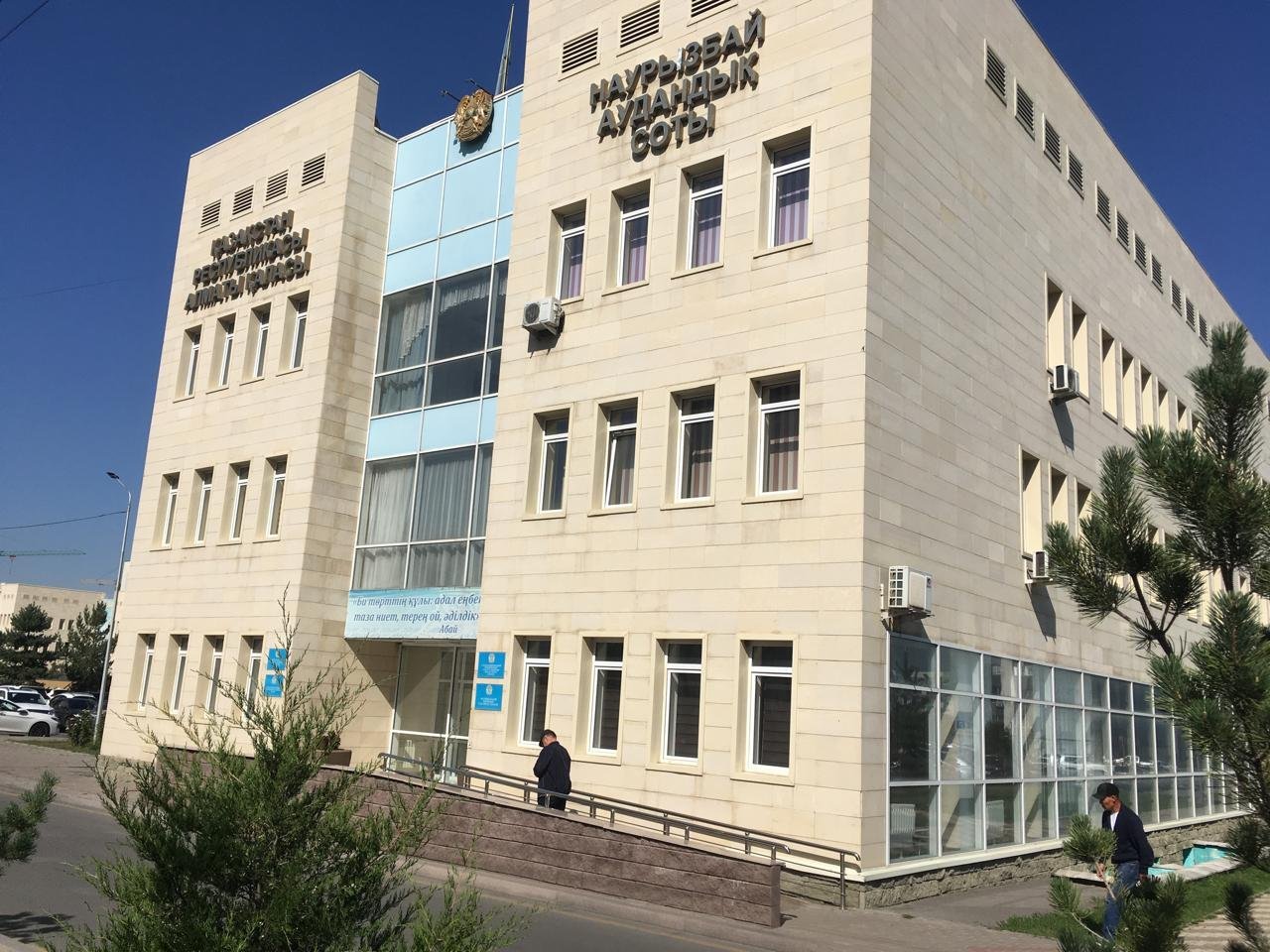
Another defense lawyer asked whether Kusheyev had any other videos besides the one filmed on January 20, 2025. The question arose because Kudaibergen Blayev, Bakhtiyar’s father, had testified that his son was being blackmailed with incriminating footage.
Kusheyev replied that he had posted only one video about Bakhtiyar Blayev on social media. He also mentioned that Kudaibergen Blayev had threatened Kurmangazy Aitmukanov, one of the co-defendants.
On the evening of January 21, Kurmangazy called me. He said Kudaibergen Blayev was threatening him. He recorded their conversation on one phone while talking to him on another, then sent me the recording on Telegram as insurance. He was afraid for his life and safety. At his request, we stopped by the Auezov District Police Department, where he filed a report. Later, when our case was under investigation, I asked whether that report had ever been reviewed. I realized the police were lobbying for the Blayev family’s interests — because when Bakhtiyar filed a report, it was processed. But when Kurmangazy did, it wasn’t.
The defense reminded the court that Blayev and Kusheyev were confronted on January 24, 2025. At that time, Blayev stated he had no claims against the activist. Later, he changed his testimony and accused Kusheyev of extortion.
The defense asked why he had changed his mind — and how Kusheyev would characterize Blayev today.
'Now I can describe Blayev as an extremely negative person,' Kusheyev said. 'Kurmangazy testified that he beat his wives and even filed complaints against his wife and mother-in-law, accusing them of stealing his money. Yet now he says we ruined his life — that he’s single because of us. Come on. His father got a suspended sentence, and he and his brother served time in a penal colony. What does any of that have to do with us?'
The lawyer then asked what might have motivated Blayev to file the extortion report — especially since he initially sought to resolve the dispute peacefully.
'Blayev was originally charged with five counts, but was tried on only two,' Kusheyev explained. 'Aitmukanov appealed to the Supreme Court, asking for a review of the verdict. Blayev wanted him to withdraw that appeal. He was afraid that if the case was reviewed, he could actually face a seven-year prison term — maybe others would too. If Aitmukanov had withdrawn his appeal, Blayev would have dropped his 19-million-tenge civil claim and forgiven Belyansky’s debts. A real prison term is far more frightening than financial losses.'
At the end of the hearing, Ruslan Karimov asked Kusheyev to clarify in which language Blayev and Aitmukanov communicated during their meetings at the gas station and café.
Mostly in Kazakh. Esteemed court and jury! Ruslan doesn’t speak the state language, so he couldn’t understand what they were saying. He made no demands. I’m telling you — the initiative came from Blayev, Damir Kusheyev told the court.
During questioning, defendant Ruslan Karimov asked Kusheyev to recall an incident from the fall of 2024, when the two had gone to the Almaty City Prosecutor’s Office to meet with a deputy prosecutor about a dispute over trees.
While waiting in the hallway, they unexpectedly witnessed a scene that Kusheyev later described as revealing.
We saw two deputy prosecutors and Aitmukanov. One of them addressed him by name — Bakhtiyar — and said the matter had been resolved. Aitmukanov introduced himself, and they fell silent. He realized they had mistaken him for Bakhtiyar Blayev. This shows that the prosecutor’s office was lobbying for the Blayev family’s interests. In this country, anyone—an uncle, a businessman, an employee — can just call the prosecutor and influence a case, Kusheyev said.
The activist also recalled a scandal in late December 2024. Together with blogger Anton Knyazev, he filmed a video showing an employee of the city prosecutor’s office committing three traffic violations while entering a departmental parking lot — failing to wear a seatbelt, talking on the phone, and not yielding to pedestrians.
Knyazev approached the car, knocked on the window, and reprimanded the driver.
The response from authorities was swift.
I was standing nearby, and by order of the administrative court, I was placed in a special detention center for 15 days for ‘petty hooliganism.’ The question is — what for? For Anton reprimanding the prosecutor’s office employee? We hadn’t even made it to the Bostandyk District Police Department, and the prosecutor-driver’s report was already on the investigator’s desk, Kusheyev said.
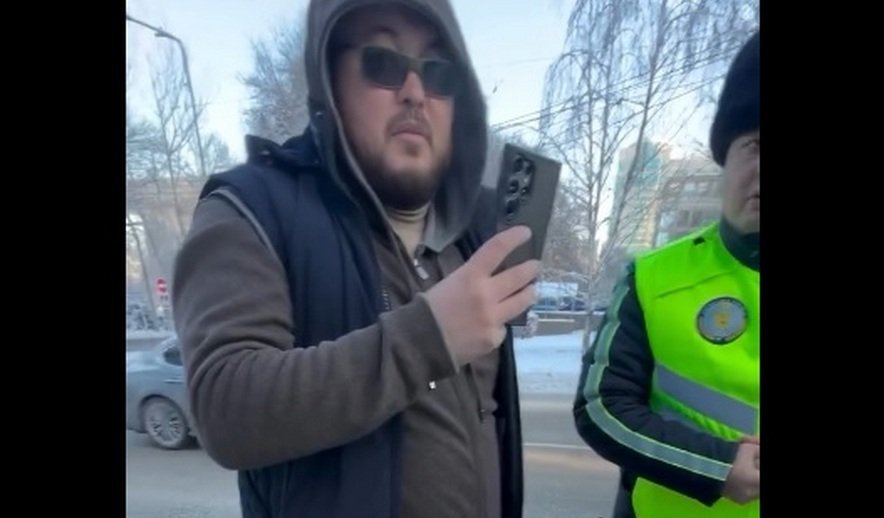
He went on to recall another notorious episode involving a prosecutor from Aqtau, drawing parallels to what he described as “double standards” in Kazakhstan’s justice system.
Recently, the news showed the Aqtau city prosecutor causing a drunken scene at Almaty Airport. The prosecutor was inside a bus (likely the one used to transport passengers from the terminal to the aircraft stairs – ed.). Transport police detained him and filed a report. However, the judge acquitted him on the grounds that a bus is not considered a public place. I had a similar situation, but the reaction was completely different — which clearly shows the double standards in our justice system. So, let me get this straight: a bus isn’t a public place, but a prosecutor’s car is?
Toward the end of his testimony, Damir Kusheyev spoke about his projects promoting domestic tourism, healthy living, and the cultural legacy of Abay. Many Kazakhstanis know him better as a cyclist than as an anti-corruption activist.
In 2020, the year marking the 175th anniversary of Abay, Kusheyev completed a cycling journey through 20 countries, visiting every monument dedicated to the great Kazakh philosopher and educator. The trip drew international media coverage, and the Abay Foundation awarded him a commemorative medal.
In court, he presented letters of gratitude from officials recognizing his contribution to hiking and cycling tourism in Kazakhstan.
However, the atmosphere in the courtroom shifted when the state prosecutors began cross-examining him. Their barrage of questions visibly irritated the activist, prompting an intervention from Judge Bakirbayev.
'Kusheyev, you are not in a position to argue with the prosecution,' the judge warned. 'Observe the established procedure and show respect to the prosecutors.'
In the next part, we’ll cover Kusheyev’s heated exchange with prosecutors, the emotional testimony of his wife Akmeir, and the brief but telling statement from co-defendant Andrey Belyansky.
Original Author: Zhanar Kusanova
Latest news
- Settlement Reached in Phuket Over Layan Green Park Eco-Condo Dispute
- MIA Shakes Up Jambyl Region Police Department Leadership
- Georgian Prosecutors Charge Five Over October 4 Protest
- Kulager Hockey Club Employee Detained on Fraud Suspicion
- Almaty Woman Appeals Sentence for Abusive Ex-Husband
- Memorial Plaque Honoring Saltanat Nukenova Unveiled in Qostanay Region
- Kazakhstan Becomes World’s Top Gold Buyer in August as Global Prices Hit Record Highs
- Trial of Activists Kusheyev and Karimov Nears Its Conclusion
- Dimash Qudaibergen Opens World Tour with Sold-Out Madison Square Garden Concert
- Questions Surround Construction of Presidential Library in Central Almaty
- Rare Kulans Captured on Camera in Altyn-Emel National Park
- Border Service Soldier Dies in Almaty Region; Investigation Underway, Family Raises Questions
- New Details Emerge in the Qaraganda Police Station Incident
- Ruslan Berdenov Appointed Head of Almaty City Development Center
- Japarov: Kyrgyzstan's Citizens Will Decide on Death Penalty Reinstatement
- Protests Erupt in Tbilisi Amid Local Elections
- High-Profile Corruption Trial Nears Conclusion in Shymkent
- Hockey Club Employee in Northern Kazakhstan Faces Fraud Charges Over Player Passports
- Armenia: Archbishop Mikael Ajapahyan Sentenced to Two Years in Prison
- Drones Target Oil Refinery in Russia’s Orenburg Region

